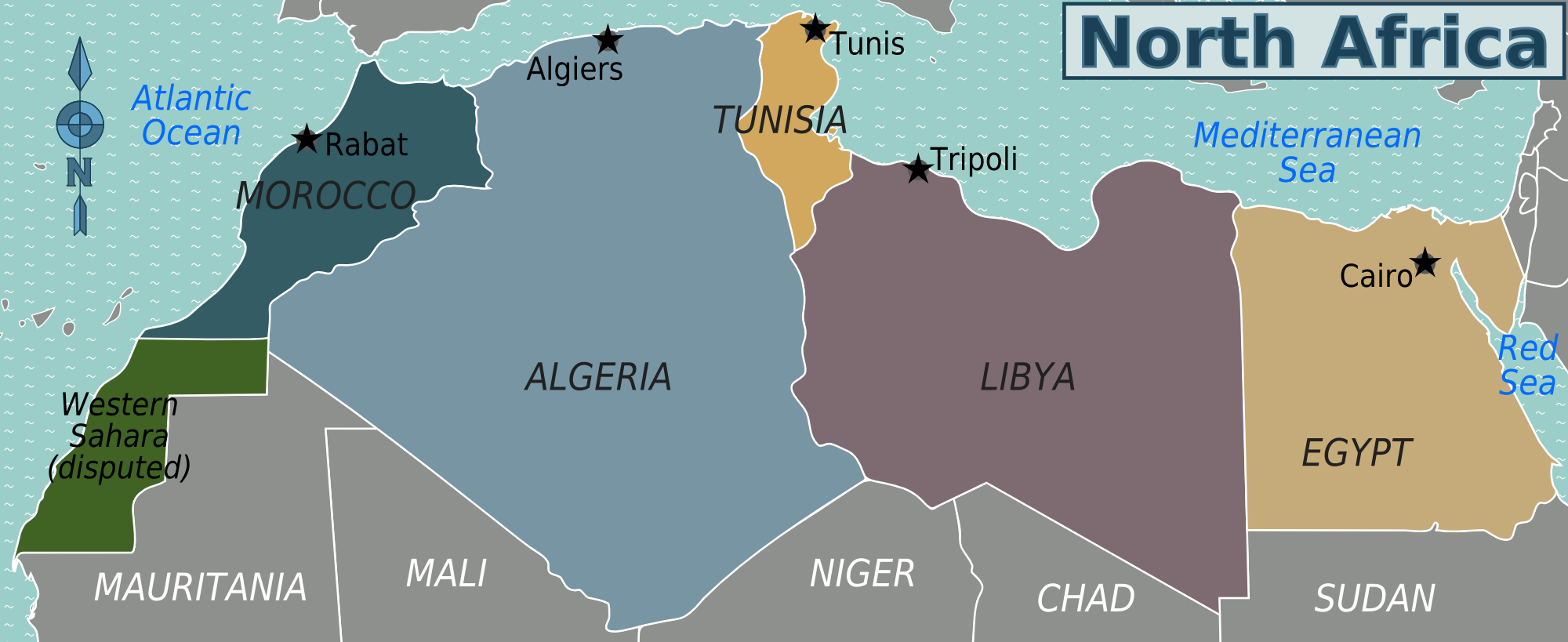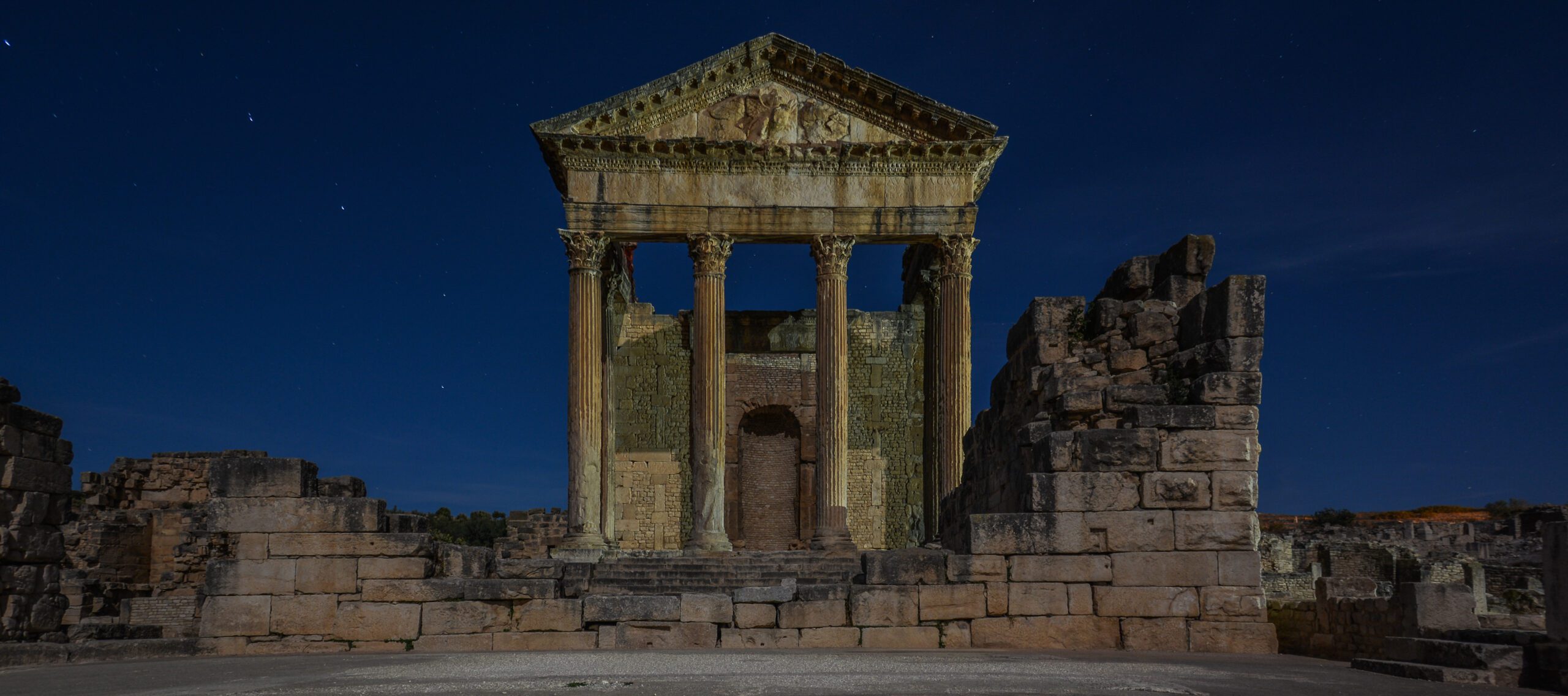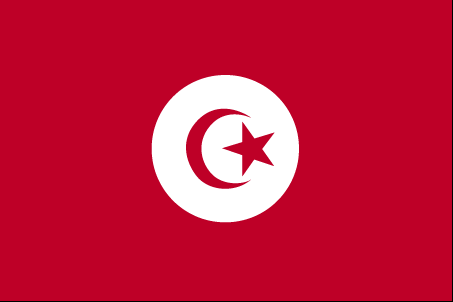
+11 Million
Population
+1,300 km
Along the Mediterranean Sea
+163,610
Square Kilometres
Get Ready to Started?
Tunisia
Country Overview
Tunisia, officially known as the Republic of Tunisia, is a North African country renowned for its Mediterranean allure. This nation captivates visitors with its vibrant mix of sandy beaches, ancient ruins, and rich Arab-Islamic culture, all nestled within a remarkably diverse yet compact landscape. Tunisia is also celebrated for its profound historical significance and its crucial role in the Arab Spring movement, marking it as a cornerstone of regional cultural and political development.
Geographic Location
Tunisia is situated in the Maghreb region of North Africa, nestled between Algeria to the west, Libya to the southeast, and the Mediterranean Sea to the north and east. It is strategically located at the crossroads of Africa, Europe, and the Middle East, providing a unique cultural and historical heritage.
Map showing Tunisia’s location in Africa. By Sanjay Rao
Getting Around
Major and Minor Airports:
- Tunis-Carthage International Airport (Tunis): The main international gateway, connecting Tunisia to Europe, Africa, and the Middle East.
- Monastir Habib Bourguiba International Airport (Monastir): Popular with tourists visiting the coastal resorts of Sousse and Monastir.
- Djerba–Zarzis International Airport (Djerba): Serves the island of Djerba and surrounding regions, a favorite destination for its beaches and historic sites.
- Tozeur–Nefta International Airport (Tozeur): Ideal for exploring the Sahara Desert and the unique oasis landscapes.
- Enfidha–Hammamet International Airport (Enfidha): Convenient for travelers heading to Hammamet and nearby coastal areas.
Flying Times to Tunisia:
Here are approximate flying times to Tunisia from major global hubs:
- From Europe:
- London: Approximately 2–3 hours
- Paris: Approximately 2–3 hours
- From Asia:
- Dubai: Approximately 5–6 hours
- Tokyo: Approximately 15–16 hours
- From North America:
- New York: Approximately 8–9 hours (with layovers)
- Toronto: Approximately 9–10 hours (with layovers)
- From South America:
- São Paulo: Approximately 13–14 hours (with multiple connections)
- From Africa:
- Johannesburg: Approximately 8–9 hours (with layovers)
- Cairo: Approximately 2–3 hours
- From Oceania:
- Sydney: Approximately 20–22 hours (with multiple connections)
Popular Cities:
- Tunis: The capital city, blending historic charm in the medina with a vibrant modern atmosphere.
- Sousse: A coastal city with beautiful beaches, lively souks, and the UNESCO-listed Ribat of Sousse.
- Monastir: Known for its scenic harbor, historic Ribat, and picturesque resorts.
- Djerba: A tranquil island offering sandy beaches, traditional Berber villages, and ancient synagogues.
- Tozeur: A gateway to the Sahara, famous for its palm oases and stunning desert scenery.
Transportation: Tunisia offers domestic flights for long-distance travel and a reliable rail network connecting major cities like Tunis, Sousse, and Sfax. Buses and louages (shared minibusses) are affordable and widely used for intercity routes, while taxis and trams operate in urban areas. Renting a car or cycling is a great option for exploring at your own pace.
Did You Know?
Tunisia was the filming location for the iconic desert planet Tatooine in the original “Star Wars” movies, and you can still visit the sets in the Tunisian desert today.
Popular Destinations
- Tunis: The capital city, known for its vibrant medina, Bardo Museum, and the blend of ancient and modern architecture.
- Sidi Bou Said: A picturesque coastal town famous for its blue-and-white buildings and stunning Mediterranean views.
- Carthage: An ancient city and UNESCO World Heritage site, showcasing Roman ruins and the history of the once-great Carthaginian Empire.
- Djerba: A serene island with sandy beaches, traditional Berber villages, and unique cultural landmarks like El Ghriba Synagogue.
- Tozeur: A gateway to the Sahara, known for its palm-filled oases, traditional brick architecture, and Star Wars filming locations.
- Kairouan: An important Islamic cultural center, home to the Great Mosque and a UNESCO World Heritage medina.
- El Jem: Site of one of the world’s best-preserved Roman amphitheaters, a UNESCO World Heritage site.
- Matmata: Famous for its underground troglodyte homes and as a filming location for Star Wars.
- Sousse: A coastal city with a historic medina, sandy beaches, and a lively atmosphere, perfect for relaxation and exploration.
- Dougga: A remarkable Roman archaeological site offering breathtaking ruins and panoramic views.
Social and Cultural Insights
People and Society: Tunisia is a culturally diverse nation, with Arabic as the official language and Tunisian Arabic (Derja) widely spoken in daily life. French, a legacy of colonial history, remains prominent in business, law, and academia, while Berber (Tamazight) is spoken by small rural communities.
The majority of Tunisians are Sunni Muslims, which influences the country’s cultural fabric. They have made significant strides in women’s rights, with women’s equality being a key aspect of its political and social landscape. It is the only country in the Arab world where polygamy is forbidden by law, and a high percentage of women in political positions.
Culture: Tunisia’s culture is a combination of Arab, Berber, and European influences, reflected in its music, art, cuisine, and festivals.
- The country is known for its vibrant music scene, with traditional genres like malouf and chaabi being popular.
- The country also hosts several festivals and events throughout the year, showcasing its cultural heritage.
- Tunisian cuisine is a fusion of Mediterranean and Middle Eastern flavors, with dishes like couscous and brik being national favorites.
Cultural Etiquette and Tips: In Tunisia, social interactions are warm and welcoming, often starting with a friendly “As-salamu alaykum” or “Bonjour,” reflecting the country’s blend of Arabic and French influences. Hospitality is central to Tunisian culture, and guests are often offered mint tea or sweets as a gesture of goodwill. While cities are more relaxed, modest attire is still appreciated in rural areas and near religious sites. Bargaining in markets is not only expected but seen as part of the cultural experience, so feel free to engage with good humor. Tunisians are proud of their traditions, so showing interest in local customs and history can create meaningful connections.
Public Holidays:
- New Year’s Day: January 1
- Independence Day: March 20 (Celebrating Tunisia’s independence from France in 1956).
- Martyrs’ Day: April 9 (Honoring those who fought for Tunisia’s independence).
- Labor Day: May 1
- Republic Day: July 25 (Marking the establishment of the Tunisian Republic in 1957).
- Women’s Day: August 13 (Celebrating women’s rights and achievements in Tunisia).
- Eid al-Fitr: Date varies (Celebrating the end of Ramadan).
- Eid al-Adha: Date varies (Festival of Sacrifice).
- Islamic New Year (Hijri New Year): Date varies.
- Mawlid al-Nabi: Date varies (Commemorating the birth of Prophet Muhammad).

Temple of the Six Columns, Dougga, Tunisia By IssamBarhoumi
Climate and Natural Highlights
Climate: Tunisia’s climate varies across regions. The northern coast, including Tunis and Sousse, enjoys a Mediterranean climate with hot, dry summers and mild, wet winters. Inland and desert areas, like Tozeur and Douz, experience scorching summers and cooler nights. The best time to visit is spring (March to May) or autumn (September to November), offering pleasant weather for sightseeing and exploring the diverse landscapes.
Sunrise and Sunset Times: Tunisia enjoys abundant sunshine year-round. In summer, the sun rises around 5:30 AM and sets at 7:30 PM, while in winter, sunrise shifts to 7:00 AM and sunset to 5:30 PM. Early mornings and late afternoons are perfect for outdoor activities, especially during the hotter months.
Wildlife and Natural Landscapes: Tunisia’s natural landscapes range from the golden sands of the Sahara Desert to the lush green forests of the north. The coastal areas boast stunning beaches and crystal-clear waters, perfect for relaxation and water activities. Inland, the salt flats of Chott El Jerid and the oases near Tozeur offer unique, picturesque views. Tunisia is also home to migratory birds and wildlife such as gazelles, adding to its ecological diversity.
Economic and Political Overview
History: Tunisia gained independence from France on 20th March, 1956, with Habib Bourguiba as its first president. The country operated as a de facto one-party state until 2011, when a national uprising led to the ousting of President Zine El Abidine Ben Ali, marking the beginning of the Arab Spring. Since then, Tunisia has been transitioning to a multi-party democracy, with the first democratic parliamentary elections held in 2014.
Government and Politics: Tunisia is a unitary semi-presidential representative democratic republic with a president serving as head of state, a prime minister as head of government, a unicameral legislature, and a court system influenced by French civil law. The president is directly elected for a five-year term, with the nominee of the party that gains the most votes in legislative elections forming a government. The Assembly of the Representatives of the People is the unicameral legislature, with members elected for a five-year term.
Economy: Tunisia has a mixed economy, with a GDP of approximately $48.3 billion (2020) and a per capita GDP of $4,100. The country’s economy is driven by agriculture, industry, and services, with tourism being a significant contributor. Tunisia is a member of the Arab League, the African Union, and the Organization of Islamic Cooperation and maintains close relations with the United States, France, and the European Union.
Safety, Health, and Entry Requirements
- Safety and Travel Advisories: Tunisia is generally safe for travelers, particularly in popular destinations such as Tunis, Sousse, and Djerba. However, staying updated on travel advisories and exercising caution near border regions with potential instability is recommended. Be mindful of local customs and respect cultural norms.
- Healthcare and Vaccinations: Tunisia has a mix of public and private healthcare facilities, with private clinics offering higher standards of care. Travelers are advised to have comprehensive travel insurance and ensure routine vaccinations are up to date. Additional vaccinations for typhoid, hepatitis A, and yellow fever may be recommended depending on the itinerary.
Visa Requirements and Entry Procedures: Citizens of many countries can visit Tunisia without a visa for up to 90 days. For longer stays or specific requirements, consult Tunisian embassies or consulates. Ensure your passport is valid for at least six months from the date of entry.

Region
Capital City
- Tunis
Currency
- Tunisian Dinar (TND)
Languages
- Arabic
- French
- Berber (Tamazight)
- English
Timezone
- Central European Time (CET), UTC+1
- United States

